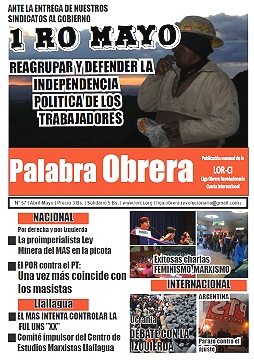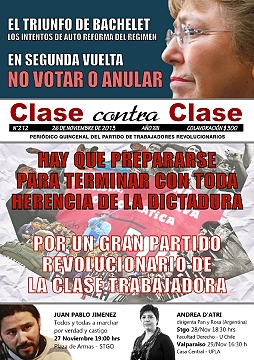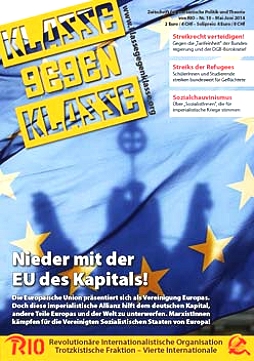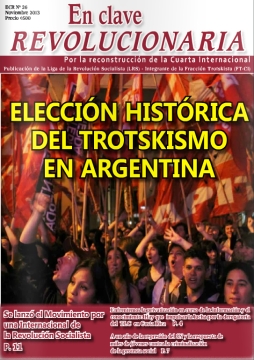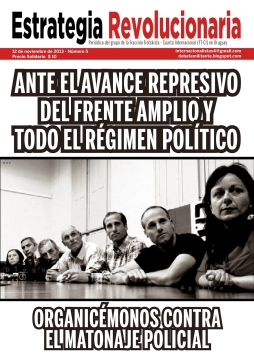Venezuela
The significance of the struggle of Sanitarios Maracay and the strike in Aragua?
03/07/2007
As we have amply described in this issue, on Tuesday, May 22, a big
sector of industrial workers of Aragua state brought its activities to
a standstill, going out into the streets, blocking almost all
the nerve centers of the state. This strike led by the workers of
Sanitarios Maracay and C-CURA [a tendency in the UNT union
federation], in solidarity with the struggle of the comrades of
Sanitarios, who have been producing for more than six months under
workers’ management and against repression by regional police and the
Guardia Nacional, forced even the Minister of Defense himself, Raúl
Baduel, to organize a meeting to discuss the workers’ demands with them.
The strike did not have "friends" in the regional or national
government; on the contrary, they tried to obstruct it until the last
minute. But the decision of the workers, encouraged by the great
example of Sanitarios Maracay and persuaded to offer their class
solidarity, was imposed in the factories and the streets. The aim,
said several of the workers, was to make the Governor, the police, the
bosses, the Guardia and the rest of the state institutions, "respect
us." And the workers won respect, with their own forces and methods of
struggle! When the Chávez government seeks to enforce a peaceful
coexistence between the working class and those who exploit it, by
substituting small concessions, granted through government decrees,
for class struggle, when it wants to set itself up as the "referee"
and place limits on the workers’ struggles through courts, judges,
legislators, and even the Guardia Nacional, this strike appears,
marking a big expression of workers’ struggle neither instructed nor
regimented by the state.
The exemplary experience of Sanitarios Maracay - with a lot of impact
on the working class of Aragua state - managed by its own workers, in
spite of delays and the national government’s negotiations with
businessmen, and even in spite of the repression the workers suffered
at the hands of the Guardia Nacional — this big workers’ action
unfolded around Sanitarios Maracay. It is because Sanitarios is
already a factory without a boss, that functions democratically
through Assemblies, a Factory Committee and several subcommittees for
management, that proves reliably that factories do not function
without workers, but they do function without bosses!
But this experience is not an isolated fact nor a fact exclusive to
Aragua state, although it has reached its highest point there. From
the middle of last year, big struggles by sectors of wage earners have
covered the country, in private as well as public enterprises, with a
diversity that goes from the struggle for rights at work, for union
recognition, against plant closings and some struggles against
government agreements with the union bureaucracy or the bosses,
including the transnational oil companies. At this time the struggle
of the workers of Vivex (for union recognition and a contract), of
Petrozuata and Sincor (against the transnational oil companies in the
Oil Belt of the Orinoco River), of Albeca (against the businessman who
is a member of Comando Miranda [the 2006 Chávez election campaign]),
and most recently, of the Parmalat workers in Zulia and Lara states
(who occupied the factories, demanding their expropriation), of the
workers of Sidor (demanding re-nationalization of the firm and the
introduction of fixed wages for the 9,000 contract-outsourced
workers), of public employees and the oil workers (against the
agreements of Ministry of Labor with the bureaucracy — even with the
coup-plotters in the petroleum sector — and for their [the workers’]
contract), of the workers of DSD and CE Minerales de Venezuela
(against super-exploitation by these transnational corporations that
benefit from government subsidies), of CVA-Azúcar (against massive
layoffs in that state enterprise), and many others in addition, have
been outstanding.
At the base of this process one finds both the fact that big economic
growth is occurring, which is known and understood by everyone, while
the essential demands of the workers continue to be postponed, and the
persistence of super-exploitation and anti-union policies (both in the
private and public sectors), maneuvers by the Ministry of Labor to
reach agreements with the bosses and the union bureaucracy of the
Fourth and Fifth [Republics], against the rank and file unions and the
class-conscious and militant tendencies, as well as the incessant
repression against protests by the workers.
In these struggles, the working men and women, the majority of whom
still trust Chávez and his government, are colliding time and again
with state institutions and government policies, which appear clearly
from the side of the bosses, as [the workers] encounter brutal and
even criminal acts of repression, like the one unleashed against
Sanitarios Maracay and the workers of DSD and CE Minerales, with the
inflexible defense of an employer because he is a chavista, like the
boss at Albeca, with agreements by the Minister of Labor even with the
pro-coup union bureaucrats of PDVSA, to isolate the militant unions
that dispute with him, or with answers like those of the President of
CVA-Azúcar about moving the firm to a different state: "The enterprise
has nothing to discuss with the workers ... this is a decision that must
be respected, whether the workers like it or not."
For this reason, although they continue to be hopeful about Chávez’
project, objectively they are beginning to fight not just against the
employers but also against the government. Among these struggles,
sectors of the vanguard are beginning to make a political experiment
with what they consider to be "their" government [i.e., workers
running things], although now cautiously. We could say that in these
cases the actions go more quickly than consciousness itself; not
accidentally, a worker from Sanitarios Maracay, which is, without a
doubt, the most advanced expression of this important process, said:
"The question is not whether we are with Chávez, but whether he is
with us, because we are beginning to have doubts." Even among vanguard
leaders of the oil workers’ union, there is beginning to be doubt over
whether this is really their government, as they thought it was until
recently.
Faced with this situation, the task now is to fight to extend these
advanced experiences of struggle, to coordinate them at a regional and
national level, from the grass roots of the struggle, in order to
provide them with strong organization and a plan of struggle, as well
as seriously discussing the need to set up an independent workers’
party, based on the unions and militant organizations of the class, to
raise working men and women to independent political struggle, and
from there to address millions of wage earners, that still trust the
"mixed economy" national development project proposed by Chávez, which
in reality rests on high oil prices and exploitation of the working class.
Translation by Yosef M.














